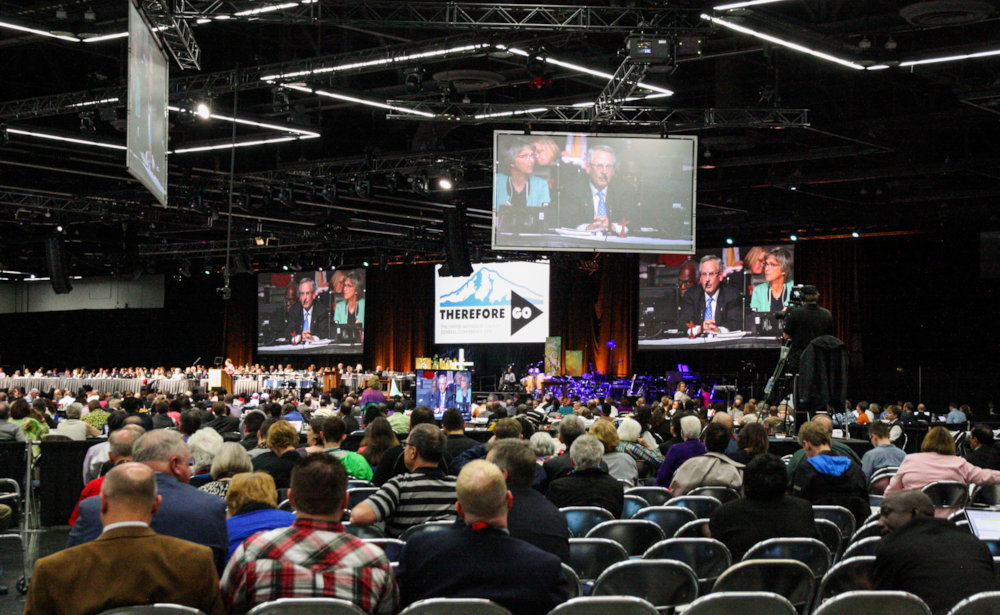Same number of delegates and two more legislative committees for Minneapolis assembly.
HEATHER HAHN
United Methodist News Service
The actual delegates at The United Methodist Church’s top lawmaking assembly will change in 2020, but the numbers likely will stay the same.
The Commission on the General Conference on Oct. 7 voted to set the target number of delegates at around 850 for 2020 — the same target the body set for the 2016 General Conference. The final number is not yet exact because of some final necessary calculations.
The commission also voted that the target number could be rounded up to meet the representation formula requirements. Half of the delegates are lay, and half are clergy.
The 2016 General Conference — and thus the subsequent special General Conference in 2019 — had 864 delegates.
The commission met Oct. 6-8 to make plans for the 2019 special General Conference in St. Louis and the 2020 General Conference in Minneapolis.
The commission also approved increasing the number of legislative committees at the 2020 gathering from 12 to 14. The goal is to more evenly distribute the workload and meet the new requirement that all submitted petitions receive a vote in committee. The 2016 General Conference saw about 1,000 petitions.
“It makes sense to me to broaden the base as far as we can to meet the requirement of touching every petition that’s been submitted,” said the Rev. Gary Graves, the secretary of General Conference.
The United Methodist Church’s constitution requires that General Conference have between 600 to 1,000 delegates. In a later paragraph, the Book of Discipline — the denomination’s top policy document — sets a formula for calculating each annual conference’s delegates based on professing lay membership and clergy. Every conference gets at least one lay and one clergy delegate.
Under that formula, the number of delegates would exceed 1,300 and overstep the constitutional limits, Graves said.
In such cases, the Book of Discipline authorizes the commission to adjust the number of delegates.
Four years ago, the commission opted to reduce the number of delegates, previously about 1,000. That commission hoped to both save money and smooth the way for The United Methodist Church to hold its first General Conference outside the United States.
Graves told current commission members that the preliminary budget for the 2020 General Conference assumed a delegate count similar to 2016.
Sara Hotchkiss, the General Conference business manager, later said that every additional 50 delegates adds roughly an extra $215,000.
Dr. Steve Furr, a commission member from the Alabama-West Florida Conference, made the motion to keep the 2020 numbers close to the 2016 target.
“We don’t know what’s going to happen in 2019, so my thought is to keep that number close to what we’ve had,” he said.
A substitute motion to reduce the target to 750 did not garner a majority of the commission’s votes.
With the top-line number set, Graves told the commission he expected to be able to notify each conference its total delegate count by Dec. 1.
Under legislation approved by the 2016 General Conference, the statistics used for calculating each delegation now must come from the annual conference journals submitted to the General Council on Finance and Administration.
Thirty annual conferences did not have any journals on file with the agency when General Conference approved the legislation, Graves said.
However, since that time, Graves and the agency has worked to ensure it has on file the most up-to-date journals from conferences around the globe. Only one annual conference has not submitted its journal at this time, Graves said.
While the delegate count is unlikely to change, the commission is looking at other changes ahead. The body has given preliminary approval to look at making General Conference’s proposed legislation and daily proceedings more digitally accessible.
A digital makeover would eliminate printing and shipping costs. It also would make it easier for delegates to see the materials they need in their preferred languages without shuffling through multiple stacks of papers, said Brian Sigmon. He is the editor of the Daily Christian Advocate, a record of General Conference’s daily proceedings, nominations and other information.
“We want this to be usable; we want this to be friendly,” Sigmon said. “And we want to give people the best, most efficient access to the information they need to do the work of General Conference.”
Last Updated on December 13, 2022

